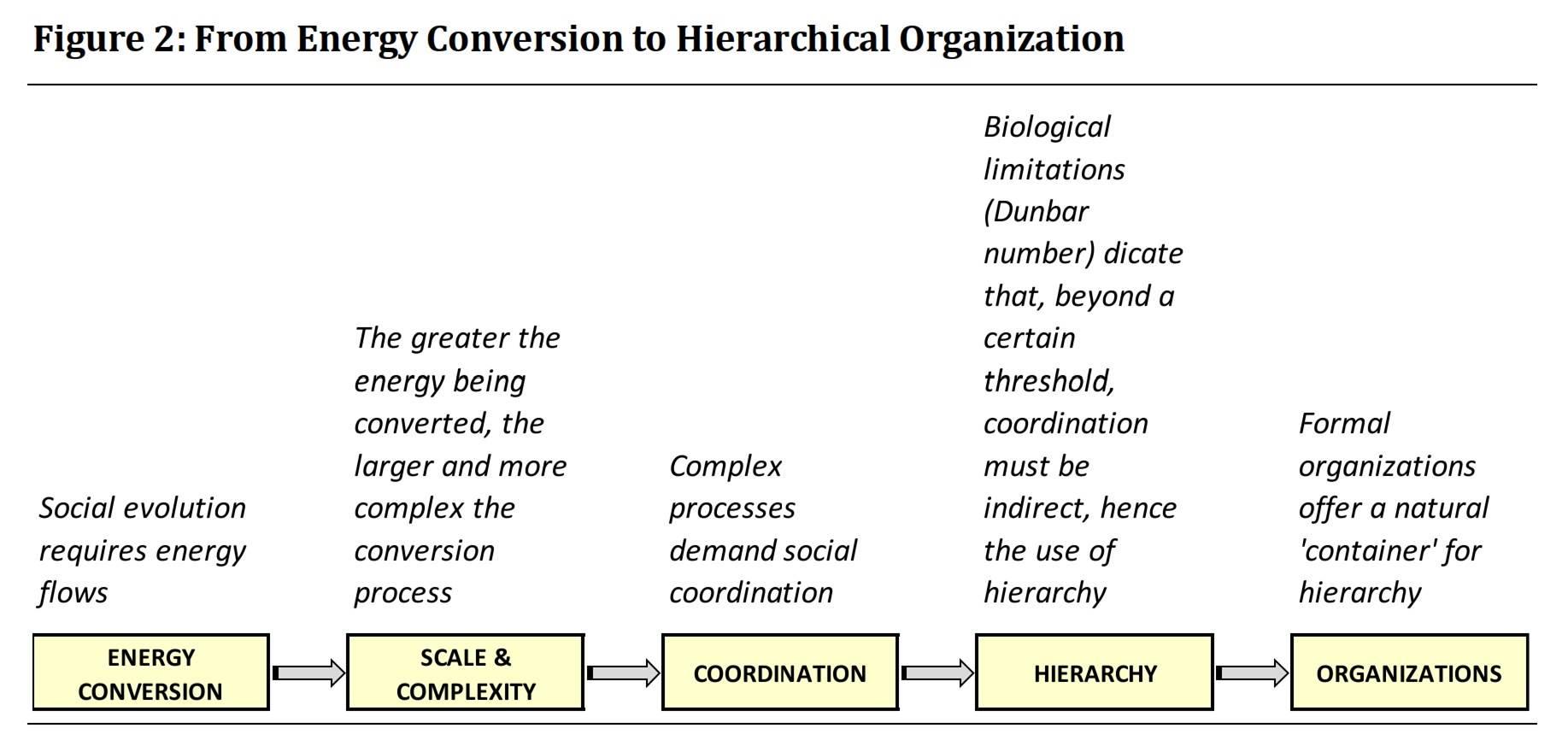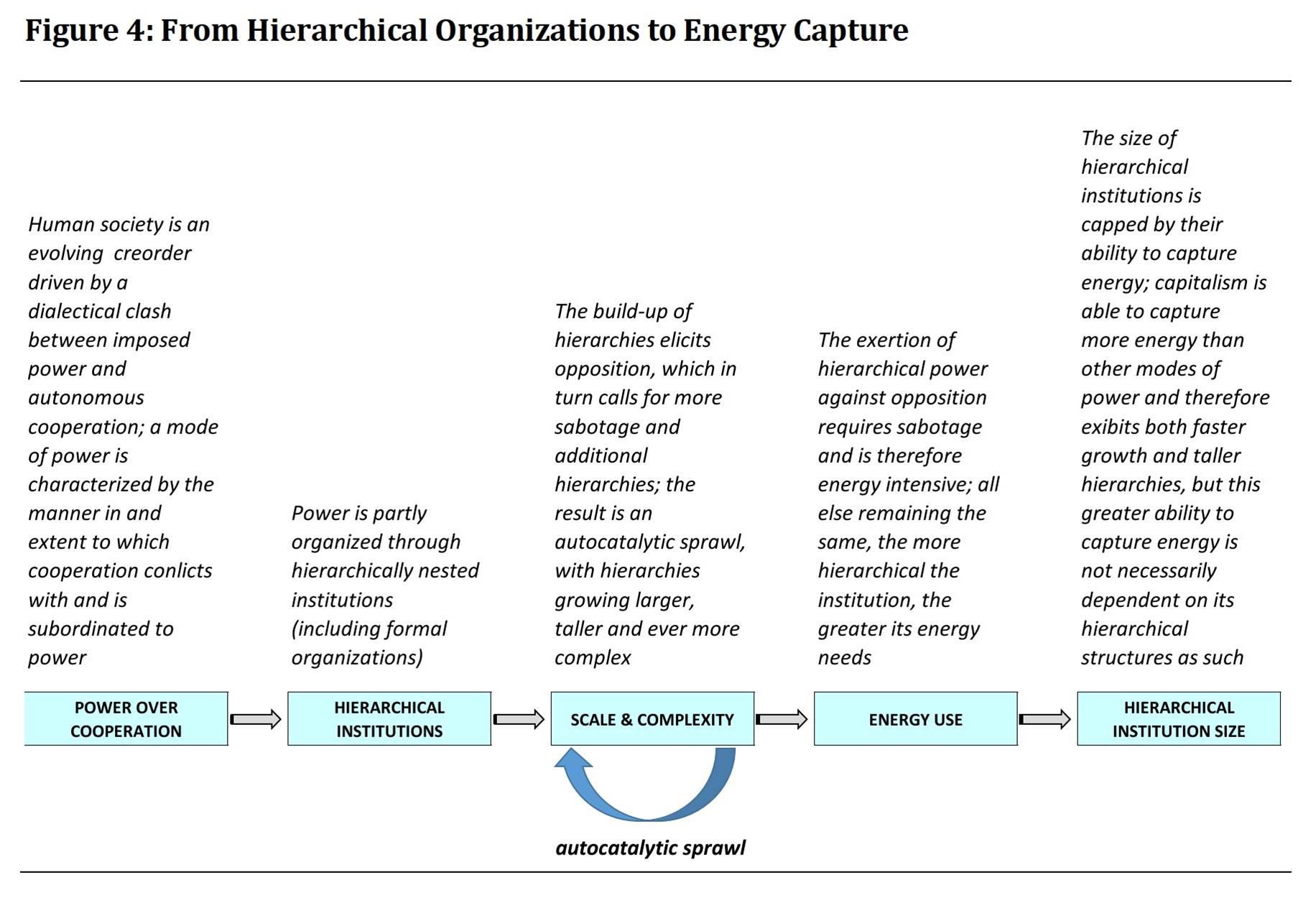- This topic has 4 replies, 4 voices, and was last updated June 1, 2021 at 11:21 am by .
-
Topic
-
(This is actually a question I sent to Blair Fix via email, having read his researches on the relationship between energy and hierarchy and thinking about its implication for some time. But I just decided to re-post here!)
I have read Blair Fix’s works on hierarchy and found how hierarchy derives energy and resource usage very interesting. I think his researches reveal a lot about the feature of human civilization: as society gets more complex, it indeed seems that hierarchy develops and energy and resource usage increases.
I think this point is very important and this is the front upon which law – which ultimately is the way society regulates and allocates rights on energy and rights to command others – has been working (in the way that, unfortunately, exacerbates hierarchy and indeed increases consumption) and with which, I think, law indeed can contribute to dealing with the already happening and incoming environmental catastrophes.
The traditional or mainstream view on environment in law (and economics) is the one based on Ronald Coase’s proposition of “voluntary exchanges” or “right to pollute” which allegedly “maximizes community welfare.” My feeling is that all the usual proposals for both ETS and carbon tax are based on the Coasian view, and I think it’s completely wrong in that 1) its neoclassical basis is wrong 2) it ignores the non-linear and complex nature of biosphere. Ultimately, I think, this view just legitimizes the rich consuming energy and resources as long as they can pay for it – crystallizing the same hierarchy mentioned above.
I also think incorporating the aspect of thermodynamics and physical reality into any analysis is crucial for describing the real world, in that, simply speaking, we can’t live without energy and low-entropy resources. Unfortunately, it seems, most economists and other scholars and policymakers do not care about this aspect. There are now many talks on “green finance”, “ESG”, and so on, picturing some kind of a rosy future in which the current mode of economic growth can persist indefinitely, but I genuinely think people don’t understand what they talk about.
I also think understanding the specific institutional design properties of our society is important, and I agree that the underlying principle guiding these tendencies is power – mostly authorized and exercised in the form of law (as I wrote in the previous post.) Thomas Piketty’s research on the historical trend of income and wealth inequality was indeed valuable, but I think his explanation that “capitalism just increases inequality over time” is very misguided (also to me it seemed that he based on his argument on the false neoclassical conception of capital and he was apparently unaware of the CCC).
I think there are specific legal and institutional designs that have led to these outcomes. One is patent monopoly, which has no economic justification whatsoever, that has enabled the gigantic upward transfer of income and wealth to Big Pharma and elite universities over the last 4 decades – fortunately this issue has gained some attention in recent months with a new focus on TRIPS.
In sum, I think the relationship between hierarchy and energy/resource usage is important, but I think it’ll be much better if there can be some investigation of the specific institutional features and mechanisms of this relationship.
One place from which I think such investigation can start is the issue of urbanization and the development of industrial and logistical value chains. Indeed urbanization is one of the key defining aspects of “development” in human history, across the world, and personal consumption of energy increases as urbanization happens. I think cities can theoretically be more efficient in energy consumption due to the reduction in distances for travel and logistics and more efficient heating in relatively bigger compounds, but it seems that in reality cities “suck” energy and resources from surroundings.
And I don’t think this “sucking” is just a figurative word. The reason cities lead to higher energy consumption is that “”it also provides bigger markets and permits the development of increasingly complex manufacturing and service industries, raising urban productivity still further”, as this article suggest.
https://www.reuters.com/article/us-global-energy-kemp-column-idUSKBN1XN239
In terms of the actual institutional features that lead to higher energy consumption, I think there are several, all of which are related to the issue “supply chain” and the distance of *delivering* stuffs to cities.
1) One is the political economy of car dependency. Although we all know cars are the least efficient means of production, the political economy imposed by car manufactures makes us maximize the number of cars on the road, leading to higher energy consumption.
2) The “complexity” of our mass-produced consumption goods presumably requires consolidation of firms and requires more energy from production itself and all the parts and materials shipped from all over the world. Also the consumerist political economy makes goods less durable, and with all the advertisements, induce constant “fabrication of wants” (as JK Galbraith pointed out).
3) Cities need resources – especially food – that have to be continuously shipped from outside. I mean, how many kilometers have our food on the table passed before getting to us? Probably hundreds or thousand of kilometers. And this has to happen every moment – otherwise billions of population living in urban areas on this planet will starve.
Perhaps I might be focusing too much on these very specific sectors but I think they are important. Transportation accounts for about 16% of global GHG emissions, energy use in industry accounts for 24%, and agriculture accounts for 18%. https://ourworldindata.org/emissions-by-sector
So I think dealing with these issue might be beneficial. Also I think we can get the solution to the ecological crises from this front. At the end of the day, as Albert Einstein pointed out, we live in a mass production society and most people (even in his time) live in cities, and any proposals for making the world better must start from where we are now.
I think hierarchy should be decreased to save humanity. Taxing the rich is necessary, but I think we should go beyond that. I think we should intentionally reduce the complexity of our mass productions, decrease the distance of shipments, and ultimately disentangle the complex, gigantic value chains and build a more locally-based societies (especially with regard to food production) to reduce energy and resource consumption. Of course, we should seriously think about how much the way we consume and live our lives will change if such reduction in industrial and logistical hierarchy and complexity really happen.
What the Covid-19 crisis showed us is that the current “just-in-time” global trade (whether it’s about PPEs or about vaccines) is extremely fragile. And I think the fragility will exacerbate as global warming continues. We’ve already reached 1.1-2 degrees C increase since preindustrial, and what environmental scientists suggest (that most economists and policymakers ignore) is that, as we reach 1.5 degrees C, our food production will be under extreme stresses and our global agricultural system might face the risk of collapse. I think, unfortunately, this is the trajectory we’re in. Global food production will collapse, and just as countries shut down exports of PPEs and vaccines now, I think countries will resort to a kind of “food nationalism.” I think the current global trade, especially that of food, will end, and it might be wise for us to think about how we can reduce dependence on global trade.
This might be my pure delusion, but I think we might need a kind of “ecological antitrust” policies to reduce the size and power of institutions based on, for instance, the complexity of their production and based on the distance of shipment. Of course, this perspective is not something that antitrust law and commercial law currently cover, but I think there are ways that these fields can start to talk about it. (For instance, I think, the “business” protected by the law in fact includes the degree to which it can control and command logistics.)
- You must be logged in to reply to this topic.


